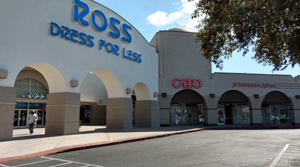
At issue: Does 2 specialty stores equal 1 Walmart
SIERRA VISTA, Arizona - A rent dispute at the Plaza Vista Mall Shopping Center has prompted a lawsuit that highlights how the loss of Walmart six years ago impacted one of the mall’s smaller longtime tenants. Plaza Vista Mall, which has nearly 230,000 square feet of retail space, is located at the northeast corner of Highway 90 and Charleston Road.
The mall opened in 1988, and for years Walmart and JCPenney were the two “major anchor tenants,” which are high-traffic, high-profile stores that help attract shoppers to a mall’s smaller retailers. In 2007 discount department store Ross replaced JCPenney. Then in November 2010, Walmart left for a larger, stand-alone building across the street at the Charleston Crossing Mall.
Walmart’s departure left Ross as Plaza Vista’s only anchor tenant of a dozen remaining stores that include Payless Shoes, Dollar Tree, and Daniel’s Jewelers. Another of the stores is Cato Fashions, which had been leasing at the mall since 2003.
Cato’s lease contains an “inducement provision” which permits the women’s fashion retailer to abate (reduce) its monthly rent by 50 percent “during any period of vacancy by either one of the Major Anchor Tenants.” Cato began submitting rent checks for only $2,032.03 per month effective November 2010.
However, a lawsuit filed by 629 Sierra Vista Retail LLC of Delaware, the landlord of Plaza Vista Mall, claims Cato is in breach of contract of its lease. The landlord asserts that “any inducement or other co-tenancy requirement” has been satisfied since early 2014 when Hobby Lobby and C-A-L Ranch started sharing the 127,000 square foot space vacated by Walmart.
The landlord’s civil action filed July 19, 2016 with the Cochise County Superior Court seeks a finding that Cato must begin paying full monthly rent of $4064.06, as well as back rent, interest, attorneys’ fees, and court costs.
Sale of shopping center prompts demand for full rent
The rent disagreement flared up in early 2016, shortly after Plaza Vista was sold to an investment group headed by Friedman Integrated Real Estate Solutions of Michigan. An attorney for the landlord commanded Cato submit full payment of rent, a demand which Cato rejected. Subsequent efforts to resolve the issue without legal action were unsuccessful.
A counterclaim filed August 24 by current lessee Cato Wo and parent company Cato Corporation based in North Carolina alleges the landlord has “failed to satisfy the requirements” of the inducement provision by not having two major anchor tenants. Cato asserts that neither Hobby Lobby (an arts and craft store) nor C-A-L Ranch (a ranch lifestyle and supply store) meet the criteria of a major anchor tenant, individually or as a set.
According to Cato’s counterclaim, the previous landlord “did not challenge Cato’s payment of reduced rent from November 2010 through January 2014.” Then, after the lease was renewed in February 2014, the landlord did not challenge Cato’s continued abated payments even though Hobby Lobby and C-A-L Ranch had opened for business in the old Walmart space.
The inducement provision also allows Cato to cancel the lease if a major anchor tenant vacates the mall and is not replaced within 12 months “by a single tenant open for business and operating exactly the same type of retail business” in all of the space. The lease states Cato’s election of one remedy “shall not preclude its exercise of any other remedy.”
The lawsuit is currently in the discovery process with depositions of key witnesses expected over the next several months. The parties have until September 25 to participate in private mediation in hopes of resolving the matter without trial. If the case is not settled by then, judge Karl Elledge will preside over a three day trial in early 2018.
The mall owner is represented by Jonathan Saffer of Snell & Wilmer in Tucson. Sierra Vista attorney Joel Borowiec and North Carolina attorney Michael Montecalvo are representing the Cato defendants.
Contact reporter Terri Jo Neff at 520-508-3660 or cjw_media@yahoo.com


